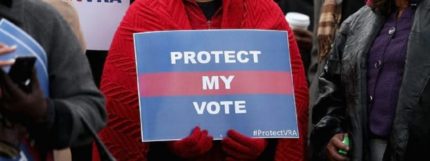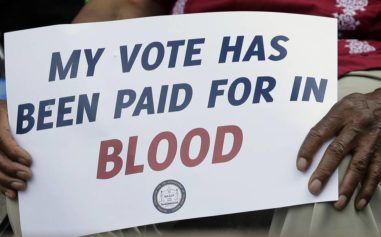In a devastating ruling for voting rights in America, the Supreme Court today struck down a key part of the historic Voting Rights Act by ruling that Southern states may no longer be forced to seek federal approval before making changes in their election laws.
On a bitterly divided 5-4 vote, the court realized the gravest fears of voting rights activists, who worried that the court would invalidate the famous Section 5 of the 1965 law. The law had been extended in 2006 by a near-unanimous vote in Congress, which is a rare event in overwhelmingly partisan Washington. The case was brought by Shelby County, Alabama.
Chief Justice John G. Roberts Jr., speaking for the majority, said the 1965 law had been a “resounding success,” ensuring that African-Americans now register and vote at the same rate as whites. But Roberts said it was no longer fair or rational to subject these states and municipalities to special scrutiny based on a formula that is more than 40 years old.
“States must beseech the federal government for permission to implement laws that they would otherwise have a right to enact and execute on their own,” he wrote. This conflicts with the principle that all the states enjoy “equal sovereignty” and cannot be subjected to different federal laws, he said.
“Our country has changed in the last 50 years,” the chief justice said. He said that Congress needs to “speak to current conditions.”
Justices Antonin Scalia, Anthony Kennedy, Clarence Thomas and Samuel A. Alito Jr. joined with the chief justice to strike down what is widely considered one of the most successful and effective pieces of legislation in U.S. history.
Speaking for the four dissenters, Justice Ruth Bader Ginsburg said the court had made an “egregious” error by striking down a law that had been extended in 2006 by a near unanimous vote in Congress.
“Today’s ruling by the Supreme Court striking down parts of this important law is more than a disappointment — it’s an injustice,” said Donna Brazile, Vice-Chair for Voter Registration and Participation for the Democratic National Committee. “But we can’t let it discourage us or force us out of this fight.”
At issue was whether the bitter racism of the South has changed enough for the nine states under the jurisdiction of Section 5 to be freed from oversight by the U.S. Justice Department. Section 5 mandates that officials in a “covered” jurisdiction must prove to the satisfaction of federal officials that a “proposed voting change does not deny or abridge the right to vote on account of race, color, or membership in a language minority group.”
Nine states are completely “covered” by the section, while five other states have certain counties covered, and two states have only certain townships covered.
In February , when the case was argued before the court, Frank “Butch” Ellis, the Shelby County attorney since 1964 — the year before the Voting Rights act was enacted — told NPR’s Supreme Court expert, Nina Totenberg, that there’s no more discrimination in the South than anywhere else.
“There’s probably bits of it everywhere, but there’s no evidence that it’s more prevalent in these covered jurisdictions than it is in the non-covered jurisdictions. That’s our complaint.”
But of course many didn’t see it that way.
“Shelby County still advertises itself as the heart of the ‘Heart of Dixie,’ and that tells you that some things have not changed, or at least haven’t changed enough to take the bandage off the wound,” said Pam Karlan to NPR. Karlan is a voting-rights expert who wrote a “friend of the court” brief on behalf of the bipartisan group of lawmakers involved in the 2006 reauthorization of the act.
The overwhelmingly bipartisan vote by Congress in 2006 was a key piece of evidence for those who wanted to keep the act in place. In this time of bitterly partisan politics, Congress voted 98-0 in the Senate and 390-33 in the House to extend the act another 25 years, it was then signed into law by President George W. Bush.
“What the 12,000 pages of hearing (testimony) showed” is that for many of the jurisdictions, “there still was pervasive discrimination,” said Republican Congressman James Sensenbrenner of Wisconsin, who led weeks of hearings in the House as chairman of the Judiciary Committee in 2006 when the act was extended.
In an opinion piece for Politico, Rep. Trey Martinez Fischer, a seven-term Texas representative from San Antonio and chairman of the Mexican American Legislative Caucus, wrote, ”When so many lawmakers agree on a bill, and a president not only signs the bill into law but also uses one of his last acts in power in 2009 to try to uphold that law when challenged (by a group of Texans, no less), the Supreme Court, as a co-equal branch of government, should take note.”
The decision will now allow Texas to go forward with implementing its voter ID law and plans to redistrict its congressional districts. Those state actions were halted under the part of the law struck down Tuesday.
The decision leaves intact the rest of the Voting Rights Act, which makes it illegal to adopt or enforce laws that have a discriminatory effect on minority voters.
An article in The Atlantic earlier this year pointed out that there is still “an astonishing level” of racial discrimination in the application of voting laws.
Quoting from the legal papers filed by the federal government in the Shelby County case, The Atlantic said that since 1982, “… approximately 2,400 discriminatory voting changes had been blocked by more than 750 Section 5 objections, approximately 400 of which involved cases with specific evidence of intentional discrimination.”
Without Section 5, the government argued in the court papers, minority voters would have had to sue individually, at great cost of time and money, in some cases after having lost their right to vote.
Back in February, President Obama attempted to ease the fears about what will happen to the voting rights of minorities if Section 5 was declared unconstitutional by the court.
“I know in the past some folks have worried that if the Supreme Court strikes down Section 5 of the Voting Rights Act, they’re going to lose their right to vote. That’s not the case,” Obama said in an interview on SiriusXM with host Joe Madison. “People will still have the same rights not to be discriminated against when it comes to voting, you just won’t have this mechanism, this tool, that allows you to kind of stay ahead of certain practices.”


